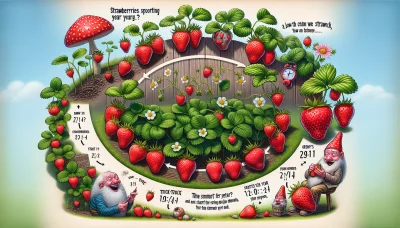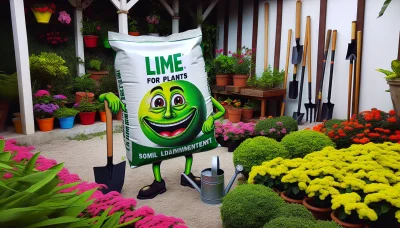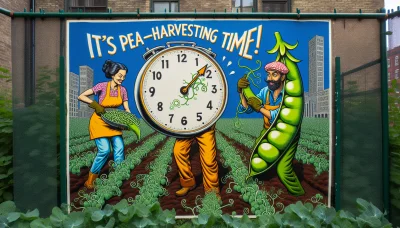Growing kiwi fruit Quiz
Test Your Knowledge
Question of
Introduction to Growing Kiwi Fruit
Kiwi fruit cultivation has gained popularity among home gardeners due to its nutritional benefits and the exotic touch it adds to the garden. Originating from China, kiwi plants require a temperate climate to thrive, making them suitable for a wide range of environments. Growing kiwi fruit successfully involves understanding the plant's basic needs, including well-drained soil, ample sunlight, and regular watering. Additionally, most kiwi plants are dioecious, meaning both male and female plants are necessary for fruit production. With the right care and conditions, kiwi vines can produce fruit for many years, offering a rewarding experience for gardeners looking to diversify their home gardens.
Choosing the Right Kiwi Variety
When it comes to selecting the perfect kiwi variety for your home garden, understanding the differences between hardy and tropical types is key. Hardy kiwis, such as the Actinidia arguta, are well-suited for cooler climates and can withstand temperatures as low as -25 degrees Fahrenheit. These smaller, smooth-skinned fruits don't require peeling and are known for their sweet taste. On the other hand, tropical kiwi varieties, like the well-known Actinidia deliciosa, demand warmer climates and longer growing seasons. These are the traditional fuzzy kiwis that are larger and have a tangier flavor. Both types of kiwis require male and female plants for pollination, so planning your garden with this in mind is essential for a fruitful harvest.
Planting Kiwi Fruit
- Choose the Right Location: Kiwi plants require a sunny, sheltered location. They thrive in areas that receive full sun for most of the day.
- Soil Preparation: Kiwi plants prefer well-drained, fertile soil with a pH between 5.5 and 7.0. Enrich the soil with plenty of organic matter before planting.
- Spacing: Space kiwi plants about 10 to 15 feet apart. If you're planting rows, space the rows at least 20 feet apart to allow for growth and air circulation.
- Planting Depth: Dig a hole that is as deep as the root ball and twice as wide. Place the kiwi plant in the hole so that the base of the plant is level with the soil surface.
- Watering: After planting, water the kiwi plant thoroughly. Kiwi plants need regular watering, especially during dry periods, to establish well.
- Support Structure: Kiwi plants are vigorous climbers and require a strong support structure, such as a trellis or fence, to grow on.
- Mulching: Apply a layer of organic mulch around the base of the plant to retain moisture, suppress weeds, and keep the root system cool.
- Fertilizing: Feed kiwi plants with a balanced fertilizer in early spring before new growth begins and again in late spring.
- Pruning: Prune kiwi plants in winter to maintain their shape and promote healthy growth. Remove any dead or diseased wood and thin out crowded areas.
- Pollination: Ensure you have both male and female kiwi plants for pollination, or choose a self-fertile variety. One male plant can pollinate up to eight female plants.
Caring for Your Kiwi Plants
Kiwi plants require attentive care to thrive and produce fruit. Regular watering is crucial, especially during dry spells, to ensure the soil remains moist but not waterlogged. Fertilizing kiwi plants is also essential; a balanced, slow-release fertilizer applied in the spring can promote healthy growth and fruit production. Pruning is another important aspect of kiwi plant care. Prune in the winter when the plant is dormant, removing dead or overcrowded branches to improve air circulation and light penetration throughout the plant. With these care tips, your kiwi plants can grow vigorously and yield delicious fruits.
Pest and Disease Management in Kiwi Fruit
Kiwi fruit, while robust and versatile, is susceptible to various pests and diseases that can significantly impact yield and quality. Among the common pests are the kiwi fruit vine borer, which tunnels into the stems, and aphids that can spread viruses while feeding on sap. Diseases such as bacterial canker and botrytis rot also pose significant threats, leading to fruit and vine damage. Organic management of these issues involves integrated approaches such as promoting beneficial insects that prey on harmful pests, applying neem oil for its natural insecticidal properties, and using copper-based fungicides to control fungal and bacterial diseases. Regular monitoring and adopting cultural practices like proper pruning, ensuring adequate air circulation, and maintaining soil health are also crucial steps in mitigating pest and disease pressures organically.
Harvesting and Storing Kiwi Fruit
To determine when kiwi fruit is ripe for harvesting, look for fruits that have turned from their youthful green color to a brownish hue, and yield slightly under gentle pressure. The fruit should be plump and fragrant. For storing kiwi fruit, keep unripe kiwis at room temperature away from sunlight until they ripen. Once ripe, refrigerate them in a plastic bag to extend their shelf life for up to three weeks. To speed up the ripening process, place kiwis in a paper bag with an apple or banana, as these fruits release ethylene gas that promotes ripening.
Benefits of Growing Kiwi Fruit at Home
- Rich in Vitamins and Minerals: Kiwi fruit is packed with Vitamin C, Vitamin K, Vitamin E, potassium, and folate, contributing to overall health and wellness.
- Enhanced Freshness and Flavor: Home-grown kiwis are fresher and can be more flavorful than those bought from a store, as they can be picked at the peak of ripeness.
- Cost-Effective: Growing your own kiwi fruit can save money in the long run, reducing the need to purchase them at the grocery store.
- Environmental Benefits: By growing kiwis at home, you reduce the carbon footprint associated with transporting the fruit from farms to your local store.
- Improved Mental Health: Gardening activities, including growing kiwi fruit, can provide stress relief and improve mental health through connection with nature.
- Antioxidant Properties: Kiwi fruit contains antioxidants that help fight free radicals, reducing the risk of chronic diseases.
- Supports Digestive Health: Kiwis are a good source of dietary fiber, which is beneficial for digestive health.
- Encourages Healthy Eating Habits: Growing your own food can inspire a healthier diet and lifestyle, encouraging consumption of more fruits and vegetables.












